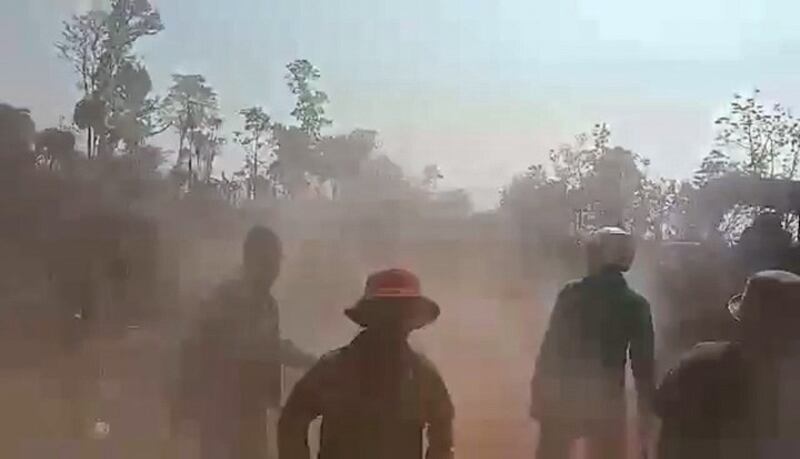Activists and villagers criticized a provincial court’s decision on Tuesday to send 28 land dispute protesters to prison one week after they were detained during a violent clash with hundreds of police officers.
The Preah Vihear Provincial Court ordered the protesters held at a prison in the northern province on charges of illegal encroachment on forest land.
More than 40 villagers have been arrested over the last week following a clash on March 6 with police in several villages in Kuleaen district where Phnom Penh-based Seila Damex has government-approved plans to develop a rubber plantation.
Authorities used tear gas and fired their guns in the air to disperse about 130 protesters who tried to stop the destruction of homes last week. The dispute with Seila Damex affects some 300 families.
Some of the protesters who were arrested have been released in recent days, villagers told Radio Free Asia. The remaining 28 were held in an undisclosed location until Tuesday’s court decision to send them to pre-trial detention.
Seila Damex was granted an economic land concession in 2011 in two communes in Kuleaen district, according to human rights group Licadho.
Local residents relied on the land to grow crops and fruit trees, but those have now been destroyed, according to one villager who told RFA she has been hiding in a forest since last week’s protest.
“Please give justice to the villagers and release them,” she said on condition of anonymity for security reasons. “Samdech [Hun Sen] promised that no one should be detained over a land dispute. But now villagers are being detained.”
‘Victims in their own land’
Hun Sen, Cambodia’s former prime minister, led the country from 1985 until last August, when he stepped down in favor of his eldest son. But the 71-year-old still retains power behind the scenes.
Cambodia’s land issues date from the 1975-79 Khmer Rouge regime, which forced large-scale evacuations and relocations, followed by a period of mass confusion over land rights and the formation of squatter communities when the refugees returned in the 1990s after a decade of civil war.

The villager said children of the 28 detained protesters are staying in a makeshift shelter and begging for rice from nearby villagers. Other villagers have fled to nearby forestland to avoid arrest, she said.
Instead of arrest and prosecution, provincial authorities and court officials should seek a solution with the land protesters, said Poek Sophorn, the executive director of Ponlok Khmer, a non-governmental organization that focuses on forest conservation in Cambodia’s northeast.
The dispute with Seila Damex has gone on for years, with no serious efforts from Cambodian government officials to find new land for the villagers, he said.
“They should be given land to feed themselves and build houses,” he said. “They are human and they are becoming victims in their own land. It is against national and international principles.”
Translated by Yun Samean. Edited by Matt Reed.
